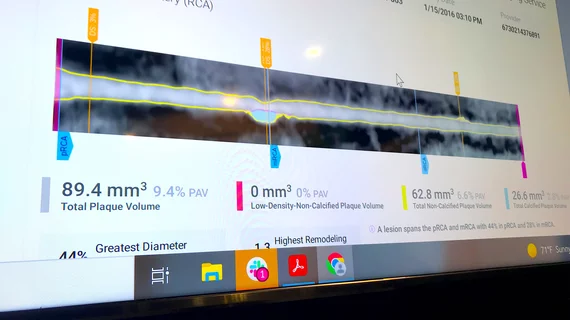Medicare administrative contractors approve coverage of AI-enabled quantitative CT
Four of the seven Medicare Administrative Contractors (MACs) will now cover artificial intelligence (AI) enabled quantitative coronary tomography (AI-QCT) and coronary plaque analysis (AI-CPA). The AI technology can be used for Medicare recipients with stable and acute symptoms suspicious of coronary artery disease (CAD). The AI software can detect CAD and create a detailed report, quantifying the types of plaques in the vessels.
This coverage for updated LCDs for current procedural terminology (CPT) codes 0623T and 0626T takes effect Nov. 24 in the Palmetto GBA, CGS Administrators, National Government Services (NGS), and WPS administrative groups. In the United States, MACs oversee coverage for about 34 million Medicare beneficiaries.
Members of the Society of Cardiovascular Computed Tomography (SCCT) Health Policy and Practice Committee (HPPC) presented as subject matter experts during a May 2023 MAC-led Multijurisdictional Meeting on CAC Non-Invasive Technology for Coronary Artery Plaque Analysis, and later provided comments on the draft LCDs that helped shape the final policies.
“This is a positive step towards improved patient care,” said Ahmad Slim, MD, FSCCT, director of imaging at Pulse Heart Institute and chair of the HPPC, said in a statement from SCCT. “Increased access to AI-CPA, AI-augmented plaque assessment analysis tools, will help medical teams make more informed decisions for their patients, and have the potential to reduce unnecessary invasive procedures downstream."
SCCT said of the remaining MACs, Noridian has not yet published their final LCD, but is expected to in a few days. Novitas Solutions and First Coast Service Options Inc. (FCSO) continue to consider coverage for AI-CPA on a case-by-case basis.
AI vendor Cleerly initiated the request for a new local coverage determination (LCD) for Medicare payment in February. However, the LCD will benefit other vendors that also offer this technology, including HeartFlow’s Plaque Analysis and Elucid's PlaqueIQ imaging analysis.
Cleerly cited several studies comparing its AI technology with the gold standard of invasive angiography, and it was demonstrated to be highly accurate in the assessment of the presence, extent and composition of coronary atherosclerotic plaque.
“We applaud this decision by the MACs to extend coverage for AI-QCT. When we first requested a coverage decision for Cleerly Labs, our goal was to ensure at-risk patients had coverage for the most advanced cardiovascular testing technology that can most effectively guide clinical decision-making,” James K. Min, MD, founder and CEO of Cleerly, said in a statement. “We are also extremely thankful to the many physicians and medical society partners who used their voices to advocate for this essential AI-QCT technology. Until Cleerly, healthcare providers have not had a way to easily and completely assess the primary cause of heart attacks, atherosclerotic plaque burden and type, in a noninvasive way."
Min said the noninvasive imaging technology can offer diagnostic information on patients without the need to send them to the cath lab. He stressed this is crucial for older patients such as Medicare beneficiaries.

